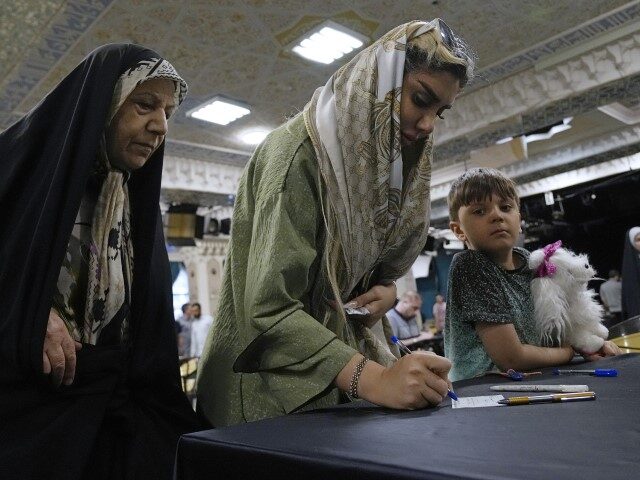Iranians who long ago gave up on voting in their sham elections, as well as dissidents who actively boycott the elections to embarrass the regime, are reportedly having some second thoughts now that “moderate” reformist candidate Mahmoud Pezeshkian has won the first round of the 2024 special election to replace the late President Ebrahim Raisi.
Turnout in the first round of the special election hit a record low of 39.9 percent. Low turnout traditionally favors hardline candidates, on the theory that regime supporters will trudge to the polls while dejected moderates and oppressed women say home, but this time Pezeshkian raked in an impressive 42.4 percent of the vote and saw off the early favorite, parliamentary speaker and former Islamic Revolutionary Guard Corps (IRGC) officer Mohammed Bagher Qalibaf.
Pezeshkian did not clear the 50-percent threshold necessary to win outright, so he will face the second-place finisher, fire-breathing cleric Saeed Jalili, in a runoff on July 5.
Influential dissidents in Iran and abroad called for a boycott of the election, which is a farce because a council of theocrats disqualifies 95 percent of the candidates before any citizen gets to vote and, even if a genuine reformer were to win, true power still lies with Supreme Leader Ayatollah Ali Khamenei.
Radio Free Europe/Radio Liberty (RFE/RL) reported that over 50 activist leaders are still urging Iranians to boycott the election, because demonstrating an utter lack of confidence in the “rigged” contest would hasten the “fall of the regime” more than voting for an ostensible moderate like Pezeshkian.
“Any political participation or vote for handpicked and powerless candidates is a dark and bitter joke,” the activists said in a statement on Sunday.
Filmmaker Hossein Dehbashi, who was jailed in July 2022 for daring to make a film that exposed a corrupt member of the Iranian theocracy, pointed out that 75 percent of the Iranian economy is “in the hands of foundations” controlled by the Supreme Leader and his theocratic cronies, so “what is the difference between bad and worse” when casting a meaningless vote for the presidency.
Dehbashi was referring to the network of phony “charitable foundations” created to plunder wealth from oppressed minorities and disfavored political groups. These trusts, known as bonyads, allow the ayatollahs and mullahs to command billions of dollars in wealth while posing as humble clerics who live frugal existences.
Pezeshkian and his supporters are shrewdly playing up his chances of winning, posing him as the only hope for keeping the deranged Jalili out of power. Pezeshkian’s critics counter that he actually supports most of the Supreme Leader’s policies and has offered only mild criticism of Khamenei’s worst excesses, like the infamous hijab law and the brutal crackdown on protests against it.
Iranian labor activist Esmail Bakhshi announced on Monday that workers at the Haft Tappeh Sugarcane Company will boycott Friday’s runoff election.
Bakhshi said Haft Tappeh’s workers stand with the “oppressed and deserving people of Iran.” The company’s workers have a history of staging protests against both the sugarcane company and the Iranian regime.
Dissident news website Iran International said on Sunday that Persian-language social media is “buzzing” with rumors that turnout in the first round of the election was much lower than the regime admitted, perhaps as low as 20 percent.
“Some of my friends now argue that we have made our point. Turnout was the lowest in any presidential elections and the reformists must have also realized that we no longer trust them to go to the polls whenever they tell us. They say, given this, we should now vote in the run-off to stop Jalili’s presidency. But there are also those who strongly disagree and say we need to take the boycott act to the next level,” one of the low-turnout conspiracy posters said.
A Tehran businessman named Hamed said he and his friends initially thought Pezeshkian would offer a “big difference” from “a fundamentalist like Jalili or a corrupt-to-the-bone politician like Qualibaf,” but when they saw how low the turnout was at polling stations last Friday, they decided to boycott the election.
“We could regret it later if we didn’t vote and let fundamentalists have an easy win but there came a text message from the interior ministry that said every vote was a vote for the ‘system’ or regime, depending on how one would prefer to translate the Persian word,” he recalled.
“We didn’t want Khamenei to use our votes as proof of the legitimacy of his rule. So, we decided to go back home without voting,” he said.
Samaneh, another Iranian dissident who participated in the Mahsa Amini uprising of 2022, took the opposite view, concluding that even “a little improvement” under Pezeshkian was better than letting Jalili “destroy the little that has remained of the economy and social freedoms.”
Samaneh said some of her friends originally planned to boycott the election, but changed their minds when Pezeshkian performed so much better than expected in the first round.
“Pezeshkian won’t help you overthrow the regime, but Jalili can lead us to become North Korea,” another Iranian woman said on social media.

COMMENTS
Please let us know if you're having issues with commenting.